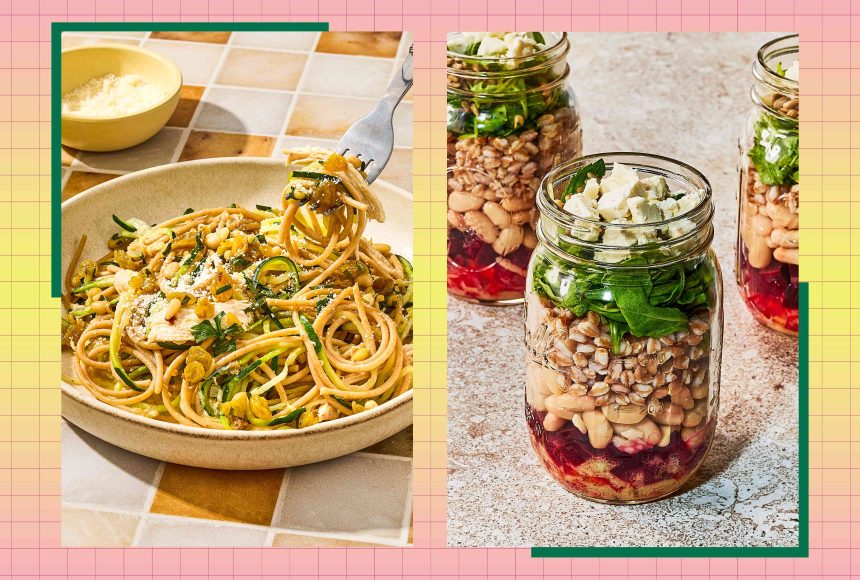Enjoy the benefits of the super-popular Mediterranean diet while pumping up your protein and fiber intake in this seven-day meal plan. You’ll find an array of fiber-rich whole grains, legumes, fruits and vegetables and a wide variety of proteins, including fish, poultry, eggs, dairy, nuts and more. This satiating combo will help keep you full and energized throughout the day. With meal-preps and three different calorie levels to choose from, this nutritious meal plan can work for most people. Check it out!
Why This Meal Plan Is Great for You
Each day of this plan provides an average of 98 grams of protein and 34 grams of fiber. Because protein makes up our cell structure, it plays a role in every function of the body, including supporting a healthy immune system and promoting muscle growth. While most of us get plenty of protein, many of us are missing the mark on fiber. Just 7% of adults reach their daily fiber intake goals of 25 grams a day for women and 38 for men. Because fiber has so many health benefits, including improving blood sugar levels and heart health, it’s a nutrient worth prioritizing.
We also incorporate the principles of the Mediterranean diet. Routinely voted as one of the healthiest eating patterns, the Mediterranean diet emphasizes fish and seafood, nuts and other healthy fats, legumes, whole grains and plenty of fruits and vegetables while limiting refined grains and excess added sugars. It’s praised for its flexible guidelines, which make it easier to follow long-term for most people. And, its nutrient-rich eating pattern has numerous health benefits, including improved heart and cognitive health and weight loss.
This 1,800-calorie meal plan has modifications for 1,500 and 2,000 calories to support those with different calorie needs. While we previously included meal plans and modifications for 1,200 calories, we no longer do. The 2020-2025 Dietary Guidelines for Americans suggests that limiting your calories to 1,200 per day is too low for most people to meet their nutritional needs, plus it’s unsustainable for long-term health and well-being.
Day 1
Photographer: Jen Causey, Food Stylist: Margaret Monroe Dickey, Prop Stylist: Priscilla Montiel
Breakfast (430 calories)
A.M. Snack (268 calories)
Lunch (373 calories)
P.M. Snack (198 calories)
- 1 cup low-fat plain strained Greek-style yogurt
- ½ cup raspberries
Dinner (436 calories)
Evening Snack (95 calories)
Daily Totals: 1,799 calories, 80g fat, 127g protein, 147g carbohydrate, 30g fiber, 2,026mg sodium.
Make it 1,500 calories: Change A.M. snack to 1 medium orange and omit evening snack.
Make it 2,000 calories: Add 2 Tbsp. natural peanut butter to evening snack.
Day 2
Photographer: Jen Causey, Food Stylist: Margaret Monroe Dickey, Prop Stylist: Christina Daley
Breakfast (448 calories)
A.M. Snack (62 calories)
Lunch (506 calories)
P.M. Snack (170 calories)
Dinner (625 calories)
Daily Totals: 1,812 calories, 93g fat, 88g protein, 170g carbohydrate, 32g fiber, 1,804mg sodium.
Make it 1,500 calories: Change P.M. snack to 1 medium orange and change dinner to 1 serving Chicken & Quinoa Casserole.
Make it 2,000 calories: Add ¼ cup unsalted dry-roasted almonds as an evening snack.
Day 3
Heami Lee, Food Stylist: Emily Nabors Hall, Prop Stylist: Christine Keeley
Breakfast (448 calories)
A.M. Snack (95 calories)
Lunch (506 calories)
P.M. Snack (198 calories)
- 1 cup low-fat plain strained Greek-style yogurt
- ½ cup raspberries
Dinner (548 calories)
Daily Totals: 1,802 calories, 76g fat, 84g protein, 217g carbohydrate, 44g fiber, 1,838mg sodium.
Make it 1,500 calories: Omit yogurt at P.M. snack and change dinner to 1 serving Tofu & Vegetable Scramble.
Make it 2,000 calories: Add 2 Tbsp. natural peanut butter to A.M. snack.
Day 4
Photographer: Rachel Marek, Food stylist: Holly Dreesman, Prop stylist: Gabriel Greco
Breakfast (421 calories)
A.M. Snack (62 calories)
Lunch (541 calories)
P.M. Snack (170 calories)
Dinner (470 calories)
Evening Snack (131 calories)
Daily Totals: 1,796 calories, 60g fat, 90g protein, 236g carbohydrate, 32g fiber, 2,154mg sodium.
Make it 1,500 calories: Omit strawberries at breakfast, change P.M. snack to 1 medium orange and omit evening snack.
Make it 2,000 calories: Add ¼ cup unsalted dry-roasted almonds to evening snack.
Day 5
Photographer: Jen Causey, Food Stylist: Margaret Monroe Dickey, Prop Stylist: Christina Daley
Breakfast (430 calories)
A.M. Snack (131 calories)
Lunch (506 calories)
P.M. Snack (198 calories)
- 1 cup low-fat plain strained Greek-style yogurt
- ½ cup raspberries
Dinner (540 calories)
Daily Totals: 1,805 calories, 77g fat, 88g protein, 196g carbohydrate, 39g fiber, 2,229mg sodium.
Make it 1,500 calories: Change A.M. snack to ½ cup sliced cucumber and omit yogurt at P.M. snack.
Make it 2,000 calories: Add 3 Tbsp. chopped walnuts to P.M. snack and add 1 medium orange as an evening snack.
Day 6
Photographer: Greg DuPree, Prop stylist: Shell Royster, Food stylist: Emily Hall
Breakfast (421 calories)
A.M. Snack (122 calories)
Lunch (574 calories)
P.M. Snack (170 calories)
Dinner (398 calories)
Evening Snack (131 calories)
Daily Totals: 1,817 calories, 73g fat, 93g protein, 205g carbohydrate, 31g fiber, 2,053mg sodium.
Make it 1,500 calories: Omit strawberries at breakfast, change P.M. snack to 1 clementine and omit evening snack.
Make it 2,000 calories: Add 1 cup low-fat plain kefir to breakfast and add 1 medium apple to lunch.
Day 7
Photographer: Jen Causey, Food Stylist: Margaret Monroe Dickey, Prop Stylist: Priscilla Montiel
Breakfast (430 calories)
A.M. Snack (122 calories)
Lunch (574 calories)
P.M. Snack (237 calories)
- ¾ cup low-fat plain strained Greek-style yogurt
- 1 cup blackberries
- 1 Tbsp. chia seeds
Dinner (450 calories)
Daily Totals: 1,814 calories, 99g fat, 117g protein, 115g carbohydrate, 30g fiber, 2,058mg sodium.
Make it 1,500 calories: Omit blueberries at breakfast, change A.M. snack to 1 clementine and omit yogurt and chia seeds at P.M. snack.
Make it 2,000 calories: Add 1 medium apple to lunch and add 2 Tbsp. chopped walnuts to P.M. snack.
How to Meal-Prep Your Week of Meals:
- Make High-Protein Raspberry & Peanut Butter Overnight Oats to have for breakfast on Days 2 and 3.
- Prepare Anti-Inflammatory Farro & White Bean Salad to have for lunch on Days 2 through 5.
Frequently Asked Questions
-
Is it OK to mix and match meals if there is one I do not like?Yes! Meal plans are meant to be enjoyed, so feel free to mix and match meals if there’s one you don’t like, or browse some of our other Mediterranean diet recipes for additional inspiration. We aimed for 1,800 calories and a minimum of 80 grams of protein and 30 grams of fiber per day, though most days came in higher in protein and fiber than that. If you’re closely monitoring calories or other nutrients and making a swap, you may want to choose a meal that has a similar nutrition profile or plan to adjust a snack or two.
-
Can I eat the same breakfast or lunch every day?If you prefer to eat the same breakfast or lunch every day, go for it! The breakfasts have 421 to 448 calories, while the lunches span approximately 375 to 575 calories. While the breakfast ranges are fairly similar, the lunches are more variable. If you’re closely monitoring calories, you may want to adjust a snack or two.
-
Why is there not a modification for 1,200 calories?We no longer provide modifications for 1,200-calorie days in our meal plans. The 2020-2025 Dietary Guidelines for Americans suggests that limiting calories to 1,200 per day is too low for most people to meet their nutritional needs, plus it’s unsustainable for long-term health and well-being.
-
What are the health benefits of fiber?Fiber is a type of indigestible carbohydrate found in foods like whole grains, legumes, fruits, vegetables and nuts. It’s linked to many benefits, including improved digestion and more regular bowel movements, better cholesterol, weight loss and more stable blood sugar levels.
High-Fiber & High-Protein Foods to Focus On:
- Beans and lentils
- Whole grains
- Nuts and seeds
- Fruit
- Vegetables
- Poultry
- Eggs
- Soy, including tofu and edamame
- Dairy
- Fish
- Seafood
Is the Mediterranean Diet Healthy?
The Mediterranean diet is consistently named one of the healthiest diets by U.S. News & World Report, largely due to the significant research showing its health benefits. Research links following the Mediterranean diet with a reduced risk of heart disease, type 2 diabetes, nonalcoholic fatty liver disease and even some cancers. Adherence to the Mediterranean diet is also linked to a reduced risk of developing obesity and gaining weight over time. Routinely following the Mediterranean diet may even extend the length and quality of your life. To follow the Mediterranean diet, prioritize healthy fats, seafood, fruits, vegetables, legumes and whole grains while limiting refined grains, added sugars and processed foods. Cooking more meals at home, eating seasonally and sharing meals with others whenever possible are also cornerstones of this healthy eating routine.






